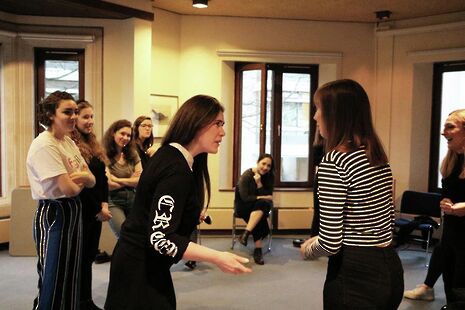A Theatre of One’s Own
Iris Pearson explores the continued importance of non-male spaces in theatre, and the way it prompts reimaginings of plays we think we know well

Comic Sans Men. Mark My Words. This week alone sees two productions deliberately created by female or non-binary directors, writers and actors, carving out a new space for women in theatre. The importance of such projects happening now is undisputed in Cambridge and indeed British theatre more widely, but their long-term aims and intentions are perhaps less clear. Are they a means to an end – a necessary part of liberating theatre from its male grip, and therefore no longer needed once such liberation has been achieved? Or are they an innovation which will transcend gender equality debates, and remain a permanent fixture of theatre?
“It’s not a conspiracy by men to keep women off film or stage, it’s just they don’t notice if we’re not there,” said director Phylida Lloyd at a lecture on recent British theatre. While Lloyd nicely articulates a theatrical scene where male roles take pride of place, I would question her use of the present tense here. The problem of female absence in theatre lies predominantly not, I would argue, in present attitudes, but in the very history of theatre and the playwrights of the past.
When only 31% of plays are written by women, the audience is denied a vision of half the human mind.
One option in the creation of female theatre is to recast traditionally male roles with female actresses. This inversion of gender reinvents well-known plays, as the roles become freed from their fixed gender, widening the characters from man and woman into human. Take as an example the recent Cambridge Arts Theatre production of Romeo and Juliet, where Mercutio, Romeo’s best friend, was played by a female actress. Both director and actor are encouraged here to consider in more detail the relationship between Romeo and his friend, walking the thin line between platonic and romantic intimacy. This forces a consideration of the character’s reality beyond the qualities and relationships imposed by gender stereotypes. Mercutio’s role in this production becomes an advisory one, as a woman experienced in love and who can see through the fantasies and self-delusions of Romeo’s infatuation with Rosalind. Defying the stereotype of the placid woman, it is Mercutio who fights to defend Romeo, and in this way the play sheds a new light on gender roles both within and outside the play.
The showcase of new writing Mark My Words (17 February) tackles the issue of the need for a female theatrical space from a different angle. The production features five pieces of new writing by female, non-binary or trans male Cambridge students, and is entirely directed and performed by people with these gender identities. This project gives a platform for exploring the uniqueness of interaction without men, catalysing thoughts about the role of the woman and the nature of their relationships. As much ancient theatre, written at a time where women were not given such freedom to write, centres on the masculine, it is important now to take advantage of woman’s promoted position in society and to reflect this emancipation on the stage. Female writing reflects, explicitly or implicitly, female experience. When only 31% of new plays performed in British theatres (2013) are written by women, surely the audience is denied a vision of half the human mind?
Female and non-binary theatre is important, and it can be presented in different ways, both separate from and alongside men. The endeavours that we see on the Cambridge stages function less as a means to an end than as a permanent fixture of theatre, continuing to assert a female space and forcing reconsideration and reconfiguration of the stage and of plays we know so well
 Features / Are you more yourself at Cambridge or away from it? 27 January 2026
Features / Are you more yourself at Cambridge or away from it? 27 January 2026 News / Vigil held for tenth anniversary of PhD student’s death28 January 2026
News / Vigil held for tenth anniversary of PhD student’s death28 January 2026 Interviews / Lord Leggatt on becoming a Supreme Court Justice21 January 2026
Interviews / Lord Leggatt on becoming a Supreme Court Justice21 January 2026 News / Reform candidate retracts claim of being Cambridge alum 26 January 2026
News / Reform candidate retracts claim of being Cambridge alum 26 January 2026 Comment / How Cambridge Made Me Lose My Faith26 January 2026
Comment / How Cambridge Made Me Lose My Faith26 January 2026










